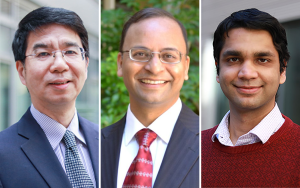
In 2023, several faculty in the Computer Science Department at the University of California, Los Angeles were named among the top one hundred AI 2000 Most Influential Scholars worldwide in fields of computer science. The AI 2000 ranking highlights the contributions of several influential faculty members and researchers in the department, including Professors Amit Sahai [#1 in Theory], Jason Cong [#1 in Chip Technology], and Aditya Grover [#4 in Data Mining]. In addition, Professors Kai-Wei Chang, Guy Van den Broeck, Adnan Darwiche, George Varghese, Yizhou Sun, Bolei Zhou, and Raghu Meka are listed as the top 100 influential researchers in their fields. These individuals have made significant contributions to theory, data mining, computer graphics, chip technology, computer vision, knowledge engineering, NLP, and computer networking.
UCLA Professor Amit Sahai’s decades-long research has been instrumental in developing the mathematical foundations of secure software obfuscation, for which he was honored by the National Academy of Sciences with the 2022 Michael and Sheila Held Prize. He has helped reshape the field of cryptography by introducing the first mathematically sound method for software obfuscation, which implies a solution for nearly every cryptographic problem. His breakthroughs, starting from the initial conception of “indistinguishability obfuscations” — the notion of making a computer program “unintelligible” while preserving its functionality — and culminating in new constructions based upon well-founded cryptographic assumptions, highlight how computational complexity can enable secrecy while computing in insecure environments. Sahai has received numerous national and international honors for his cryptography research, including being named a Simons Investigator and a fellow of the Association for Computing Machinery, the International Association for Cryptologic Research and the Royal Society of Arts. A dedicated teacher, Sahai received UCLA Samueli’s Lockheed Martin Excellence in Teaching Award in 2016.
UCLA professor Jason Cong’s research interests encompass electronic design automation, customized computing for machine learning and big-data applications, quantum computing, and highly scalable algorithms. After Professor Cong’s pioneering work on accelerating deep convolutional neural networks on field-programmable gate arrays (FPGAs), his team developed a number of automated synthesis algorithms and tools to enable rapid design of hardware accelerators for machine learning (ML). Some of his work include AutoSA for systolic array synthesis, Caffeine, and FlexCNN for end-to-end generation of complete ML accelerators from Cafe/PyTouch/TensorFlow to customized circuits. His goal/intention/objective is to democratize chip design for accelerating various ML applications so that each AI researcher can quickly create and implement his/her own customized ML accelerators. Cong is a Fellow of IEEE and ACM, a member of the National Academy of Engineering, and a fellow of National Academy of Inventors. He received the IEEE Robert N. Noyce Medal for fundamental contributions to electronic design automation and FPGA design methods in 2022.
Professor Aditya Grover directs the Machine Intelligence group at UCLA, where his team develops artificial intelligence frameworks that can interact and reason in the real world with limited supervision. He has made fundamental contributions to many disciplines of machine learning (ML), notably in the development of scalable unsupervised learning techniques based on generative models and contrastive learning. Recently, his research has drawn novel connections between deep generative models and sequential decision making enabling a tighter integration between perception and control. His research has been published in top scientific venues including Nature, deployed in production at big tech companies, and covered in popular press venues such as the Wall Street Journal and Wired. Aditya is also an affiliate faculty at UCLA’s Institute of Environment and Sustainability, where he grounds his research in climate change applications. His group leads the development of ClimateLearn, a popular open-source library that enables large-scale ML for climate science and recently released ClimaX, the first data-driven foundation model for weather and climate. His recent research has been recognized with a best paper award at NeurIPS, the AI Researcher of the Year Award by Samsung, and the ACM SIGKDD Doctoral Dissertation Award.
| Jason Cong | #1 Chip Technology |
| Aditya Grover | #4 Data Mining |
| Amit Sahai | #1 Theory |
